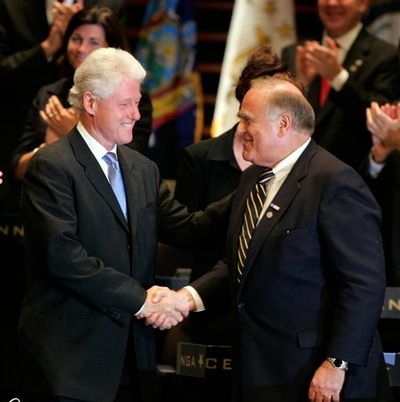Governors propose state-level stimulus

PHILADELPHIA – Many of the nation’s governors, dealing with crumbling schools, roads and water systems, would like economic stimulus checks of their own.
Gathered in Philadelphia for a conference of the National Governors Association, state leaders suggested that a federal infusion of cash – similar to the $150 billion program of rebates to individual taxpayers – could create new jobs and rebuild vital underpinnings of state economies.
“We have 100-year-old schools that need to be replaced. We have this tunnel under the Hudson that needs to be built. PATCO needs to be expanded,” New Jersey Gov. Jon Corzine said Sunday. And he said the impact of spending on such infrastructure projects “would last much longer than the rebates.”
He said each billion dollars could create 3,000 to 4,000 jobs.
Pennsylvania Gov. Ed Rendell, set to become chairman of the governors’ organization today, has said he will make infrastructure improvements the central theme of his tenure.
Earlier this year, Rendell joined with California Gov. Arnold Schwarzenegger and New York Mayor Michael Bloomberg to create a coalition to push for more federal money for highways, bridges, airports, water systems and other infrastructure.
Economists told a panel led by Michigan Gov. Jennifer M. Granholm on Sunday that a federal infrastructure stimulus would help if it funded programs already in the works. Otherwise, construction could be too late to help in the current economic downturn.
“It needs to be an infrastructure program that is ready to go,” economist Diane Swonk said. She added another caveat: “The American public will not write a blank check for pork-barrel projects.”
Corzine suggested that payments should go to projects shown to offer the greatest return to residents.
As states scramble to try to help residents losing their jobs and their homes, the governors were warned they should not expect a lot of help from the federal government.
Paul Posner, an economist at George Mason University, said the trend is toward “coercive federalism”: Washington mandates state programs without paying for them.
The governors Sunday also discussed ways to decrease reliance on foreign oil supplies and on oil in general.
South Carolina Gov. Mark Sanford dismissed as “a totally bogus government mandate” the corn-to-ethanol fuel program, and Michigan’s Granholm told the chairman of BP America that oil companies are “viewed like the tobacco companies,” seen as profiting from Americans’ misery.
Alaska Gov. Sarah Palin, whose state is home to vast oil reserves currently off-limits to drilling, urged a push to “allow our lands to be unlocked.”